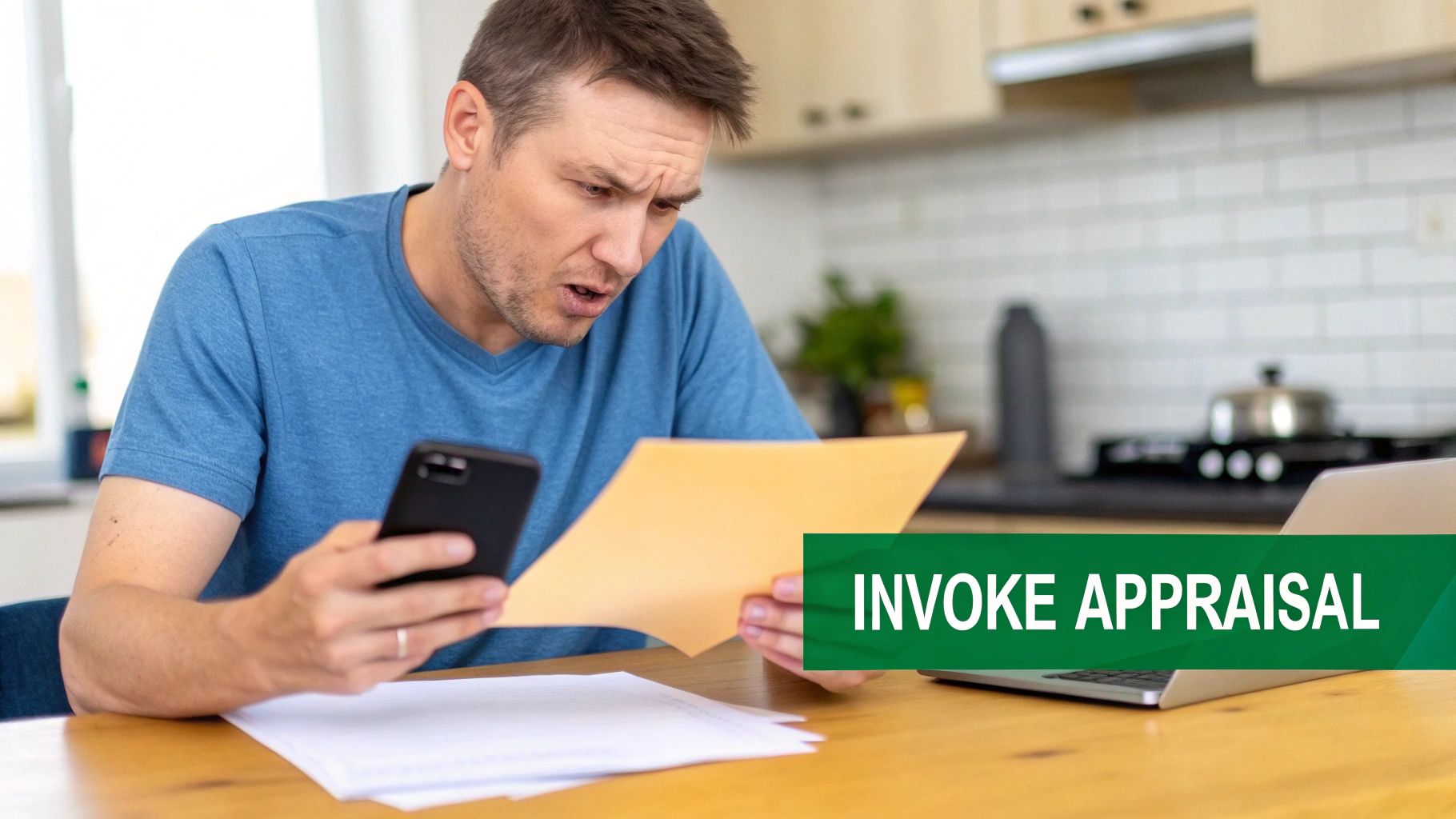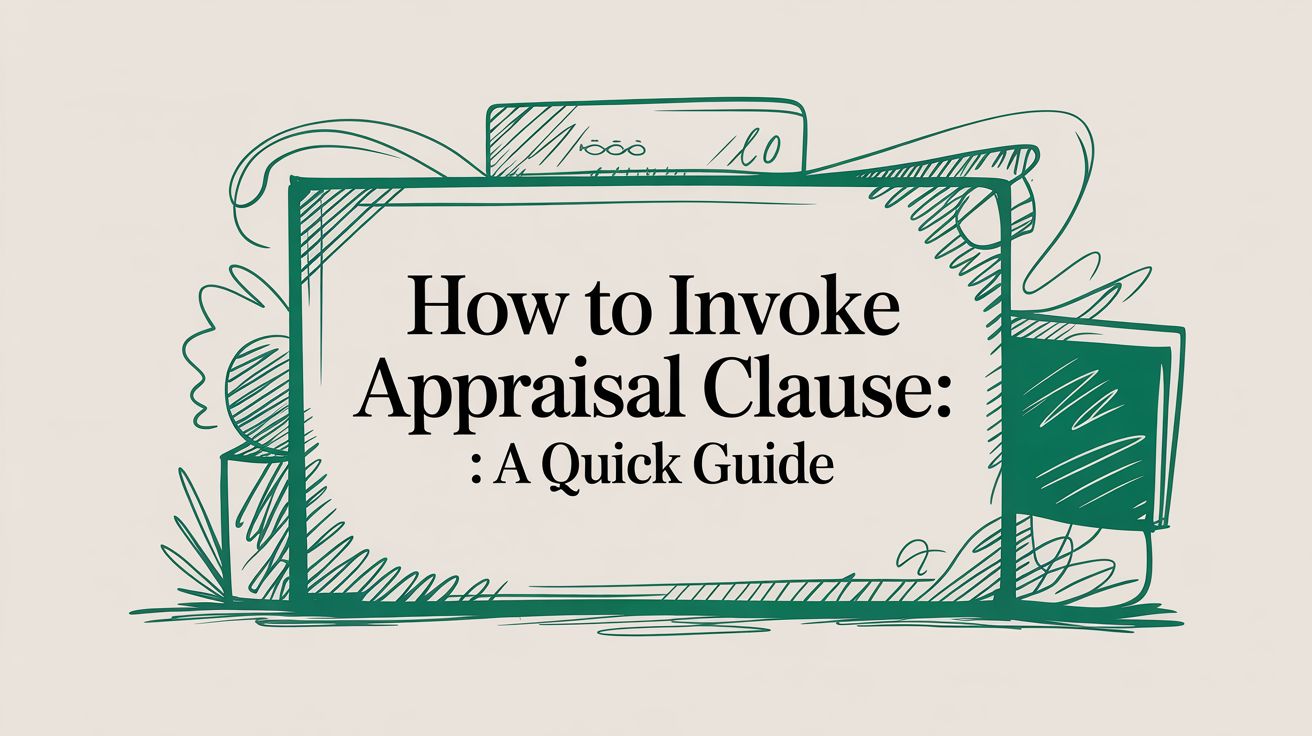Invoke the appraisal clause, Staring at a lowball insurance offer can feel like hitting a brick wall. But your policy has a tool built right in to fight back: the right to invoke the appraisal clause. This provision is your formal way to dispute an insurer’s valuation of your vehicle and get a fair, independent assessment.
What Is the Appraisal Clause and When Should You Use It?

Think of the appraisal clause as a structured, formal negotiation process. It’s a standard part of most auto insurance policies designed to resolve disagreements over the amount of a loss, not whether the loss is covered in the first place.
If you and your insurer are miles apart on your vehicle’s value—whether for a total loss claim or a diminished value claim—this clause gives you a path forward.
Instead of going back and forth with an adjuster who won’t budge, you can trigger a process where you and the insurer each hire an independent appraiser. These experts use market data and hard evidence to determine the vehicle’s true value, not just what the insurer’s software says.
Is It the Right Time to Invoke the Appraisal Clause?
Knowing when to play this card is key. You don’t want to invoke appraisal clause over a minor disagreement. You save it for situations where there’s a significant gap between the insurer’s number and what your vehicle is actually worth.
Here’s a quick guide to help you decide.
| Your Situation | Is the Appraisal Clause Applicable? | What to Consider First |
|---|---|---|
| The total loss offer is thousands less than comparable vehicles in your area. | Yes. | You’ve already presented your own market research and they won’t budge. |
| The insurer denies your diminished value claim or offers a tiny, token amount. | Yes. | You have evidence (like a SnapClaim report) showing a significant loss in value. |
| You’ve been negotiating for weeks and the adjuster is stonewalling you. | Yes. | You’ve made good-faith efforts to settle, but talks have completely stalled. |
| The insurer’s valuation report uses incorrect options, mileage, or bad comps. | Yes. | You’ve pointed out the errors, and they still refuse to correct the offer. |
| The insurer claims the damage isn’t a covered loss under your policy. | No. | This is a coverage dispute, not a value dispute. The appraisal clause won’t help. |
This process is most effective when the dispute is strictly about money. If the fight is over the car value after an accident, it’s one of the strongest tools in your arsenal.
Finding and Understanding Your Policy’s Appraisal Clause
Before you can use the appraisal clause, you have to find it in your policy. Insurance policies are notoriously dense, but you don’t need a law degree to track it down.
Look for sections labeled “Part E—Duties After an Accident or Loss” or “General Provisions.” The clause is usually tucked away there, with specific language that lays out the rules for when you and your insurer can’t agree on your vehicle’s value.
Decoding the Legal Jargon
Once you locate the clause, you’ll see some specific terms. Getting a handle on these is essential before you invoke appraisal clause.
Here’s a quick breakdown:
- Competent and Disinterested Appraiser: This means you must hire an expert in vehicle valuation who has no personal or financial stake in your claim’s outcome. The insurance company must do the same.
- Umpire: If your appraiser and the insurer’s appraiser can’t agree on a final number, they bring in a neutral third party—the umpire—to make the final call.
- Binding Award: This is the most important part. The final value agreed upon by any two of the three parties (your appraiser, the insurer’s appraiser, and the umpire) is legally binding. Both you and the insurance company must accept that figure.
The exact wording varies, but the principle is always the same: it’s a formal process designed to get a fair and final valuation.
Why This Clause Matters
The appraisal clause exists because insurance companies often undervalue claims. Their first offer is just a starting point, and it’s rarely a fair one.
A 2021 analysis by Repairer Driven News found that insurers’ initial offers were, on average, 45.86% lower than the final awards determined through the appraisal process. For vehicle owners, that meant an average of $5,312.46 left on the table per claim.
Your policy is a contract, and this clause is a critical right. Knowing where to find it and what it means is your first step toward taking control of your total loss or diminished value dispute. If you’re in a specific state, understanding local rules is just as important—our guides on Florida diminished value laws can get you started.
How to Formally Invoke Appraisal Clause
This is the moment you shift the power dynamic. Formally invoking the appraisal clause moves the argument away from frustrating phone calls and into a structured, contractual process. The key is to create an undeniable paper trail.
Forget phone calls. Put your request in writing via certified mail (with return receipt) or an email with a read receipt. This gives you concrete proof that the insurer received your demand.
A No-Nonsense Email Script to Invoke the Appraisal Clause
When you write your demand, keep it firm, professional, and factual. You disagree with their valuation and are now exercising your contractual right to settle the dispute. That’s it.
Here is a simple, customizable template. Just copy, paste, and fill in the bracketed information with your details.
Subject: Invocation of Appraisal Clause – Claim #[Your Claim Number] – [Your Full Name]
Dear [Adjuster’s Name or Claims Department],
This letter serves as my formal written demand to invoke appraisal clause under my auto insurance policy, #[Your Policy Number], regarding the claim for my [Year, Make, Model of Vehicle], VIN #[Your Vehicle’s VIN].
We have been unable to agree on the actual cash value of my vehicle following the loss on [Date of Loss]. Your settlement offer of $[Insurer’s Offer Amount] does not reflect its fair market value.
Under the terms of my policy, I am exercising my right to resolve this valuation dispute through the appraisal process.
I have selected my competent, independent appraiser:
[Your Appraiser’s Full Name]
[Appraiser’s Company Name]
[Appraiser’s Phone Number]
[Appraiser’s Email Address]
Please provide the name and contact information for your company’s appraiser within the timeframe specified in my policy (typically 20 days).
Please direct all future communications regarding this appraisal to my designated appraiser.
Sincerely,
[Your Full Name][Your Phone Number]
[Your Email Address]
[Date]
What Happens After You Send the Demand?
Once that notice is sent, the ball is in the insurer’s court. They are contractually required to respond and name their own appraiser. From there, your appraiser and theirs will get to work.
Sending your demand to invoke appraisal clause is a powerful action that can break a stalemate. It forces the insurer to stop delay tactics and engage in a process driven by facts, especially when you’re facing a low total loss payout.
Choosing a Strong Appraiser and Building Your Case
Your success after you invoke appraisal clause boils down to two things: the expert you hire and the evidence you bring. Just starting the process isn’t enough; you have to arm your appraiser with a rock-solid case.
The policy language is specific—it demands a “competent and disinterested” appraiser. You need a certified pro who understands vehicle valuation and has experience in insurance disputes.
Selecting Your Expert Appraiser
Choosing the right appraiser is the most important decision you’ll make. A weak appraiser can be steamrolled by the insurer’s representative.
Here’s what to look for:
- Certifications and Credentials: Look for industry-recognized certifications from groups like I-CAR or ASE.
- Experience with Insurance Claims: Your appraiser needs a proven track record handling diminished value and total loss disputes.
- Local Market Knowledge: Car values vary by region. A great appraiser knows your local market and can find relevant comparable vehicles (“comps”).
- Strong Communication Skills: This person is your negotiator. They need to clearly and confidently defend their findings.
Building an Evidence-Based Case
Once you’ve chosen your expert, it’s time to build the case. Your appraiser will do the heavy lifting, but the information you provide is crucial.
Start gathering these documents:
- Maintenance and Repair Records: A detailed service history proves you took care of your vehicle, supporting a higher pre-accident value.
- Photos and Videos: Any pictures of your car before the crash are gold, especially if they show custom features or excellent condition.
- Original Window Sticker or Bill of Sale: This document lists every original option and package, ensuring nothing is overlooked.
The most powerful tool you can give your appraiser is a professional, data-driven report. A SnapClaim certified report acts as the foundation of your case, providing a defensible, market-backed valuation that dismantles the insurer’s low offer.
For more details, check out our guide on car appraisal costs and what’s included.
What if the Appraisers Can’t Agree? The Umpire’s Role
If your appraiser and the insurance company’s appraiser can’t agree on a number, the process isn’t over. This is where the final stage of the appraisal clause kicks in: bringing in an umpire.
The umpire is a neutral, impartial third party who acts as a tie-breaker. Both appraisers must first agree on who to select. If they can’t, a local court can appoint one to keep the process fair.
What Does an Umpire Do?
An umpire doesn’t start from scratch. Their job is to review the evidence and arguments from both sides.
Typically, an umpire will:
- Review both appraisal reports and all supporting documents.
- Speak with each appraiser to understand their positions.
- Conduct independent market research to verify facts.
- Make a final, binding decision on the vehicle’s true value.
Understanding the Final, Binding Award
The final decision, or award, is locked in when any two of the three parties agree on a value. For example, if the umpire sides with your appraiser’s valuation, that number becomes the final settlement amount.
Once the award is signed, the fight is over. The insurance company is contractually required to pay that amount. This is why walking in with a strong case is so important. A well-documented total loss appraisal from SnapClaim provides the clear, data-driven proof needed to secure a fair number.
Let’s Talk Costs
It’s important to be upfront about the costs. You pay for your own appraiser, and the insurance company pays for theirs. The umpire’s fee is usually split 50/50 between you and the insurer.
While there’s an investment, the potential return is often huge. Spending a few hundred dollars to secure several thousand more is a trade-off most people are happy to make.
Strengthen Your Claim with a Certified Appraisal Report
Once you decide to invoke appraisal clause, your success hinges on the quality of your evidence. This is where you stop arguing and start proving.
A certified, data-driven appraisal report from SnapClaim provides the undeniable proof you need. Whether you’re fighting for a fair insurance total loss payout or proving your vehicle’s diminished value, our reports remove the guesswork.
Your Most Powerful Piece of Evidence
Insurance adjusters respond to data and documentation. Telling them your car was “worth more” is a dead end. A professional, market-based analysis systematically dismantles their low valuation.
That’s what our reports deliver:
- Market-Verified Comparables: We use real-time sales data for vehicles like yours in your local area.
- Condition and Option Adjustments: We meticulously account for your vehicle’s specific features, mileage, and pre-accident condition.
- A Defensible Final Value: The result is a clear, unbiased valuation that stands up to scrutiny from any adjuster or umpire.
Arming your appraiser with a comprehensive report from the start gives them the ammunition needed to secure a fair settlement. Learn more about how a professional car appraisal after an accident can change your claim’s outcome.
A Risk-Free Path to Fair Compensation
We are so confident in our reports that we stand behind them with a simple, no-nonsense guarantee.
SnapClaim’s Money-Back Guarantee: If your insurance recovery from the claim is less than $1,000, SnapClaim refunds the full appraisal fee—guaranteed.
Don’t let the insurance company have the final say on your vehicle’s worth. Let us provide the professional evidence you need to level the playing field.
FAQ: Your Top Questions About the Appraisal Clause
How much does it cost to invoke the appraisal clause?
You are responsible for paying your appraiser’s fee and splitting the cost of the umpire (if one is needed) with the insurer. While these costs can range from a few hundred to over a thousand dollars, the increase in your settlement often makes it a worthwhile investment. SnapClaim’s Money-Back Guarantee makes this decision risk-free.
Can I claim diminished value if the accident wasn’t my fault?
Yes. If another driver was at fault, you can file a diminished value claim against their insurance company. This compensates you for the loss in your vehicle’s resale value, even after it has been fully repaired.
Can my insurance company refuse to participate?
Not if the appraisal clause is in your policy and the dispute is over the amount of loss. If they refuse to engage, they could be in breach of contract. However, they can decline if the dispute is about coverage—that is, whether the damage is covered by the policy at all.
How long does the appraisal process take?
The timeline can range from a few weeks to several months, depending on how quickly the insurer responds, the appraisers’ schedules, and whether an umpire is needed. It’s best to invoke the appraisal clause as soon as you realize there’s a serious disagreement to avoid delays.
Don’t let a lowball offer be the final word. A certified appraisal provides the data-driven proof you need to negotiate fairly and get the compensation you deserve.
About SnapClaim
SnapClaim is a premier provider of expert diminished value and total loss appraisals. Our mission is to equip vehicle owners with clear, data-driven evidence to recover the full financial loss after an accident. Using advanced market analysis and industry expertise, we deliver accurate, defensible reports that help you negotiate confidently with insurance companies.
With a strong commitment to transparency and customer success, SnapClaim streamlines the claim process so you receive the compensation you rightfully deserve. Thousands of reports have been delivered to vehicle owners and law firms nationwide, with an average of $6,000+ in additional recovery per claim.
Why Trust This Guide
This guide was reviewed and verified by SnapClaim’s auto appraisers, who specialize in diminished value and total loss disputes. Our team continually updates every article to reflect current insurer guidelines, valuation standards, and court-accepted appraisal practices, ensuring that you’re relying on information trusted by professionals nationwide.
Get Started Today
Whether you’re challenging a low total loss settlement or proving your vehicle’s post-repair loss in value, SnapClaim makes it simple to take the next step. Generate a free diminished value or total loss estimate in minutes and see how much compensation you may be owed.




